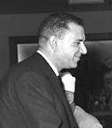Shams Badran
Shams Badran | |
|---|---|
 | |
| Minister of Defense | |
| In office 1966–1967 | |
| President | Gamal Abdel Nasser |
| Preceded by | Abdel Wahab Al Bishri |
| Succeeded by | Amin Howeidi |
| Personal details | |
| Born | 1929 (age 94–95) |
| Nationality | Egyptian |
| Residence | London |
| Alma mater | Military academy |
Shams Al Din Badran (born 1929) was one of the defense ministers of Egypt during Gamal Abdel Nasser's era. He was among the leading figures in Egypt before the 1970s.
Early life and education
Badran was born in 1929.[1] He attended military academy and graduated in 1948.[1]
Career
Badran was the head of the military security services in the mid 1960s.[2] He also served as the office manager of then-Field Marshal Abdul Hakim Amer under the Nasser's rule.[3] He was one of the top aides of Amer.[4] Then Badran was appointed minister of defense in Fall 1966 shortly before the 1967 War or Six Day War, replacing Abdel Wahab Al Bishri in the post.[1][5] Amer had supported his appointment.[6]
Badran was also named as the chief of Nasser's cabinet the same year.[7] On 25 May 1967, Badran visited Moscow and met senior Soviet officials, including then prime minister Alexei Kosygin, to secure their support regarding Israeli threat.[4] He resigned from office during the war, and was replaced by Amin Howeidi as defense minister in June 1967.[8]
Arrest and trial
Badran along with other senior officials, including Amer, was detained on 25 August 1967 due to the accusations of plotting against Nasser.[9] However, they were tried about their roles in cease fire in the six day war in 1968.[5][10] In fact, Badran was twice tried.[5] He and Salah Nasr, former chief of intelligence and also part of Amer's faction, were convicted and sentenced to hard labor due to their roles in the defeat.[11]
Allegations
The Muslim Brotherhood figures accused him and his chief, Abdul Hakim Amer, of being responsible for the torture of then Brotherhood leaders who had been arrested due to their alleged plans to assassinate Nasser in 1965.[12][13]
Personal life
Badran left Egypt and began to live in London.[14] His wife whom he divorced worked at the American University in Cairo.[14]
References
- ^ a b c Panayiotis J. Vatikiotis (1978). Nasser and His Generation. Croom Helm. p. 163. ISBN 978-0-85664-433-7. Retrieved 30 January 2013.
- ^ Gilles Kepel (1985). Muslim Extremism in Egypt: The Prophet and Pharaoh. University of California Press. p. 32. ISBN 978-0-520-05687-9. Retrieved 10 February 2014.
- ^ Mubasher, Abdou (7–13 June 2007). "The road to Naksa". Al Ahram Weekly. 848. Archived from the original on 25 March 2013. Retrieved 30 January 2013.
- ^ a b Richard Bordeaux Parker (1996). The Six-Day War: A Retrospective. University Press of Florida. p. 56. ISBN 978-0-8130-1383-1. Retrieved 30 January 2013.
- ^ a b c Hamied Ansari (1986). Egypt: The Stalled Society. SUNY Press. p. 142. ISBN 978-0-88706-183-7. Retrieved 30 January 2013.
- ^ "Egypt-Internal Relations". Mongabay. Retrieved 31 January 2013.
- ^ Afaf Lutfi Al-Sayyid Marsot (29 March 2007). A History of Egypt: From the Arab Conquest to the Present. Cambridge University Press. p. 147. ISBN 978-0-521-87717-6. Retrieved 30 January 2013.
- ^ "Nasser picks new aide". Eugene Register Guard. AP. 21 July 1967. Retrieved 30 January 2013.
- ^ "Ex-Egyptian vice president arrested". The Evening Independent. 4 September 1967. Retrieved 30 January 2013.
- ^ "1973 Info". Yom Kippur. Retrieved 30 January 2013.
- ^ Michael C. Desch (6 March 2008). Power and Military Effectiveness: The Fallacy of Democratic Triumphalism. JHU Press. p. 104. ISBN 978-0-8018-8801-4. Retrieved 30 January 2013.
- ^ "Your torture still shows on our bodies, Brothers tell Nasser's defense minister". Almasry Alyoum. 3 July 2012. Retrieved 30 January 2013.
- ^ John Sainsbury (2 August 2013). "Army-Muslim Brotherhood feud has dire consequences for Egypt's future". The Star. Retrieved 10 February 2014.
- ^ a b Mustafa el Fiqi (25 September 2008). "Shams Badran". Almasry Alyoum. Retrieved 30 January 2013.

